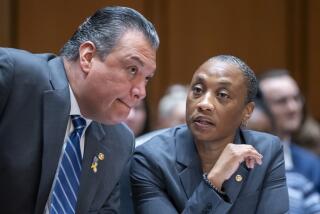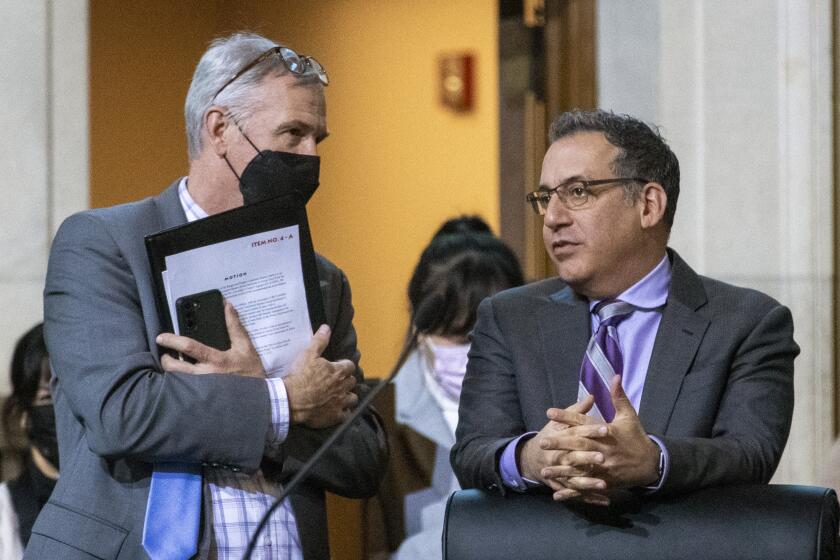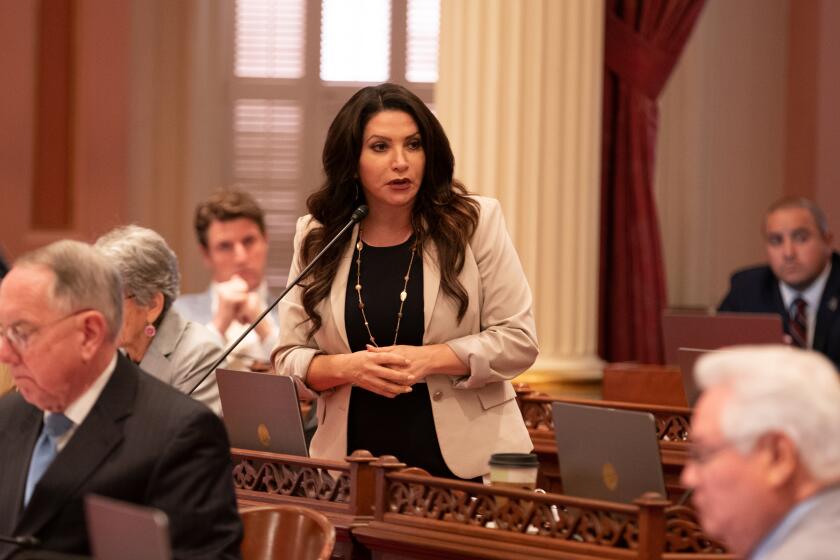Thousands Swarm Capitol to Protest Cuts
In what security officers described as one of the largest Capitol demonstrations in years, thousands of disabled Californians, college students and police representatives converged Wednesday to protest midyear budget cuts sought by Gov. Arnold Schwarzenegger.
“Governor, welcome to Sacramento,” shouted one speaker at a rally where Schwarzenegger’s proposed elimination of millions of dollars in services for the developmentally disabled was denounced as devastating.
By noon, more than 4,500 people -- many of whom said they traveled all night in buses from Southern California, and including at least one mother who rented a plane -- had poured into the building.
“We got stormed,” said Debbie Manning, chief deputy sergeant at arms of the state Senate. “Even our overflow rooms were filled.”
As disabled people, many in wheelchairs or clutching the elbows of supporters, demonstrated on the north steps of the Capitol, several dozen police officers and sheriff’s deputies in full uniform gathered in the Capitol rotunda for a lobbying effort aimed at keeping state funds flowing to cities and counties despite Schwarzenegger’s repeal of an increase in the vehicle license fee. The increase provided about $4 billion a year that local governments used to support public safety and other services.
On a sidewalk outside, meanwhile, college students protested the threatened reduction of money for college outreach programs aimed at recruiting minority students.
At one point, about 2,000 demonstrators massed outside Schwarzenegger’s office window in a scene reminiscent of the turbulent days of former Gov. Jerry Brown, when protesters ranged from farmworkers to the wives of doctors angry about malpractice insurance.
A spokesman said the governor, who was the target of the first major Capitol demonstrations since he took office 3 1/2 weeks ago, was “well aware” of the demonstrators and their concerns. But he kept to his corner office, where he and legislators negotiated in a restarted attempt to agree on a fiscal recovery program for California.
“The governor recognizes that the state must get its fiscal house in order if it is to continue to provide services to all participants in state programs” spokesman Vince Sollitto said.
A senior spokesman, Rob Stutzman, said such protests were to be expected when difficult decisions such as clamping a lid on program enrollments were made. “Obviously, the stakeholders are going to scream and scream loudly,” he said.
But budget reductions aimed at the disabled are among the most controversial of the governor’s fledgling administration.
The governor has proposed cutting nonmedical services for children and adults with cerebral palsy, autism, mental retardation and other disabilities. And he wants to freeze future enrollment in the state’s growing disability care programs to the current caseload of about 185,000 people. Newcomers would be placed on a waiting list.
A platoon of speakers, including state Treasurer Phil Angelides, a potential Democratic contender for governor in 2006, promised an all-out fight against the cuts in the Legislature. Some addressed the governor as if he were present.
“This is your first taste of us,” shouted Francis Gracechild, executive director of the Sacramento office of the support organization Resources for Independent Living. “We are not going away. We’ll be back. And, guess what? We’ve got friends.”
A few minutes later as protesters wearing “Don’t cut my services” T-shirts filled Capitol hallways, members of the Senate Budget Committee opened a hearing into the reductions to the disabled and other health and human services programs.
In an unusual move, Chairman Wes Chesbro (D-Arcata) offered a virtual open microphone to disabled witnesses and their advocates.
Dan Kaiser of the California Council of the Blind warned at the Budget Committee hearing that the governor’s action “is the beginning of the dismantling of the safety net” that has protected disabled people.
Several speakers warned that if state-financed services were lost, they would have no choice but to send their children away to more costly state hospitals.
More to Read
Get the L.A. Times Politics newsletter
Deeply reported insights into legislation, politics and policy from Sacramento, Washington and beyond. In your inbox three times per week.
You may occasionally receive promotional content from the Los Angeles Times.






